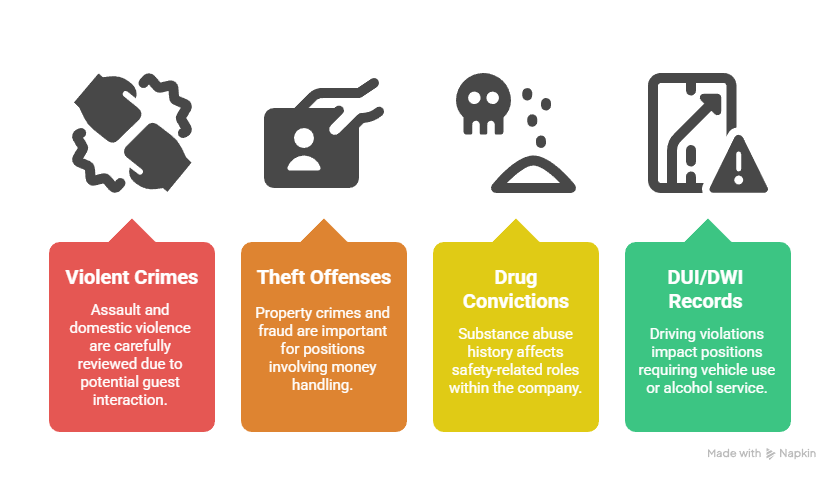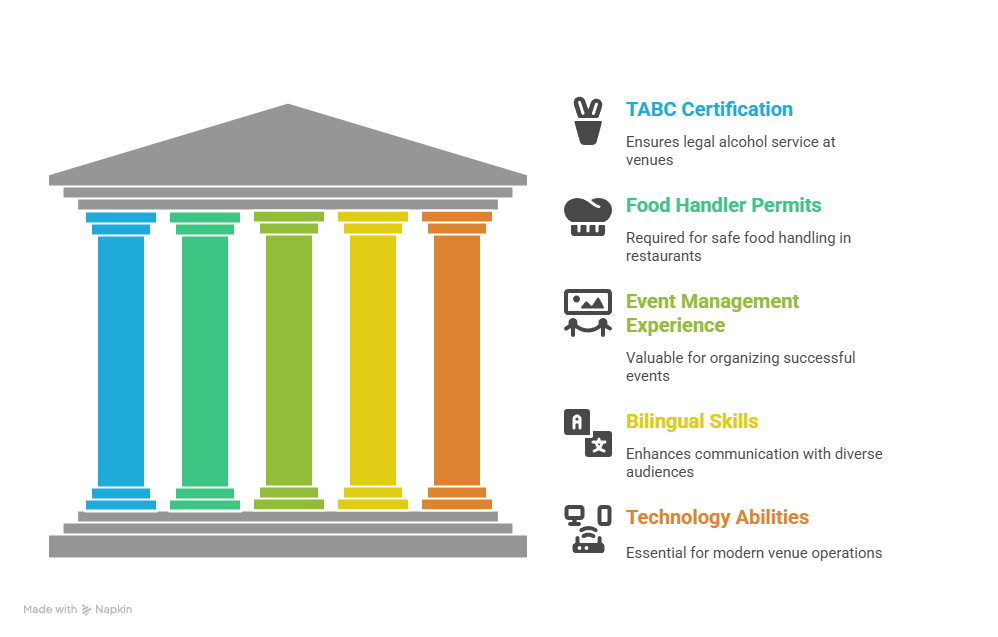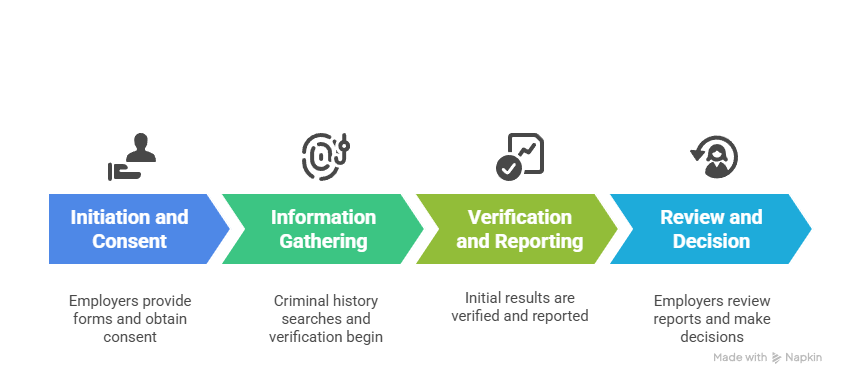Texas hospitality background checks are essential screening processes that help employers verify candidate qualifications while ensuring compliance with state and federal employment laws. Understanding the specific requirements for different hospitality sectors—from oil and gas accommodations to Austin music venues—enables both job seekers and employers to navigate the hiring process effectively.
Key Takeaways
- Texas hospitality employers must follow both state and federal background check laws, including the Fair Credit Reporting Act (FCRA) and Texas Labor Code requirements.
- Different hospitality sectors have varying screening requirements, with oil and gas hospitality facilities often requiring more extensive checks than traditional hotels or restaurants.
- Job seekers should expect background checks to cover criminal history, employment verification, and reference checks, with processing times typically ranging from 2-7 business days.
- Austin music venues and entertainment facilities may require specialized screenings due to alcohol service and crowd management responsibilities.
- Dallas convention centers and large hospitality venues often implement multi-tier screening processes for different employee access levels and responsibilities.
- Understanding your rights during the background check process, including dispute procedures and disclosure requirements, protects both employers and job candidates.
What Are Texas Hospitality Background Checks?
Texas hospitality background checks are screening processes designed for the state's hospitality industry. These checks help employers evaluate candidates for hotels, restaurants, and entertainment venues. The process includes criminal history checks, employment verification, and reference checks.
Texas has a diverse hospitality market. This includes traditional hotels and restaurants. It also covers West Texas oil and gas accommodations. Austin music venues are part of this market too. Dallas convention centers represent another major sector.
Each sector has different screening needs. Job responsibilities vary between sectors. Guest interaction levels differ. Regulatory requirements change based on the venue type. Understanding these differences helps job seekers prepare better.
Texas hospitality background screening must follow state laws. Federal FCRA requirements also apply. This ensures fair hiring practices. It also protects employer interests and guest safety.
Legal Requirements for Texas Hospitality Screening
Federal Compliance Standards
Federal laws control how employers run background checks. The Fair Credit Reporting Act (FCRA) sets key rules. Employers must get written consent before checking backgrounds. They must provide notices if screening affects hiring decisions.
The Equal Employment Opportunity Commission (EEOC) has guidelines too. These prevent discrimination against protected classes. Background check policies must be fair to all candidates.
| Federal Requirement | Description | Timeline |
| FCRA Disclosure | Written notification before screening | Before check runs |
| Candidate Consent | Signed authorization form | Before check runs |
| Adverse Action Notice | Pre-adverse action letter if issues found | 3-5 business days |
Most background checks cover seven years of history. Some serious crimes may show up longer.
Texas State Employment Laws
Texas Labor Code provides state guidelines for background checks. The state follows "employment-at-will" principles. But it maintains protections for job applicants during screening.
Texas employers cannot discriminate based on arrests without convictions. They must consider how criminal history relates to job duties. The state requires reasonable consideration of rehabilitation evidence.
Time elapsed since criminal activity matters in Texas. This helps job seekers with minor past issues. Texas also has specific guidelines for alcohol service positions.
Types of Background Checks in Texas Hospitality
Criminal History Screening
Criminal background checks are the foundation of hospitality screening. These searches cover county, state, and federal records. They identify convictions that might impact job performance or guest safety.
Texas hospitality employers focus on convictions rather than arrests. This follows state guidance on fair hiring practices. The screening examines different types of offenses:

- Violent crimes: Assault and domestic violence get careful review due to guest interaction
- Theft offenses: Property crimes and fraud matter for money-handling positions
- Drug convictions: Substance abuse history affects safety-related roles
- DUI/DWI records: Driving violations impact positions requiring vehicle use or alcohol service
Most searches look back seven years. Serious felonies may appear longer. Texas employers must show job-relatedness when making decisions based on criminal history.
Employment and Education Verification
Employment verification confirms work history accuracy. This process contacts previous employers to verify information. It checks job titles, employment dates, and reasons for leaving. Education verification confirms degrees and certifications.
Texas hospitality employers focus on recent work history. Industry-specific experience gets priority during verification. The process identifies candidates who may have lied about qualifications. It also confirms valuable hospitality experience.
Verification includes customer service skills and food safety training. Alcohol service certifications get checked too. This ensures candidates have the proper qualifications for their roles.
Industry-Specific Screening Requirements
Oil and Gas Hospitality Background Checks
West Texas oil and gas facilities need special screening. These establishments house energy workers. They often operate in remote locations with limited security.
Background checks for oil and gas hospitality include enhanced criminal screening. Drug testing requirements are common. Specialized certification verification is standard.
Transportation Worker Identification Credential (TWIC) verification may be required. Hazmat endorsement checks are common for some positions. Security clearance verification happens near critical infrastructure. These requirements reflect the specialized nature of oil and gas hospitality.
The screening often covers multiple states. This includes states where candidates worked in energy sectors. Motor vehicle record checks are frequently required. Remote locations need reliable transportation and emergency response capabilities.
Austin Music Venue Screening
Austin music venues have unique screening needs. These venues must balance welcoming environments with safety requirements. They handle diverse audiences during events.
Background checks focus on crowd management experience. Alcohol service qualifications are important. The ability to handle high-stress situations matters.
| Screening Component | Music Venue Focus | Special Considerations |
| Criminal History | Violence, drug offenses | Live music context |
| TABC Certification | Alcohol service training | Required for most jobs |
| Crowd Management | Large group experience | Essential for security |
Texas Alcoholic Beverage Commission (TABC) certification is often required. This ensures staff can legally serve alcohol. It confirms understanding of responsible service practices. Late-night operations in Austin's entertainment district need this certification.
Dallas Convention Center Staffing
Dallas convention centers use multi-tier screening systems. Access levels determine screening requirements. Job responsibilities affect the screening depth needed.
Convention centers host diverse events. These range from small meetings to large trade shows. Background checks must address security concerns. They also ensure adequate staffing for different event types.
Screening includes credential verification for specialized skills. Audio-visual technology experience gets checked. Food service qualifications are verified. Security operation skills are confirmed.
Enhanced screening applies to restricted area access positions. These roles may need additional criminal history checks. Financial background checks might be required. Professional reference verification ensures appropriate personnel for premium operations.
Houston Hotel Background Screening Process
Houston hotel background screening reflects the city's diverse market. This includes luxury downtown hotels and extended-stay properties. The process begins with candidate consent forms. Comprehensive checks follow for different positions.
Front desk positions need enhanced screening. These roles access guest information and payment systems. They also control security system access. Housekeeping roles focus on theft-related history. Employment verification is important for these positions.
Food service positions emphasize health department requirements. Alcohol service qualifications matter where applicable. Houston's international business environment often requires foreign credential verification.
Houston hotel screening typically takes 3-7 business days. International background checks may need more time. The city's global clientele creates unique verification needs.
Dallas Restaurant Background Checks

Dallas restaurant background checks address food safety regulations. Alcohol service requirements are important. Customer interaction responsibilities get evaluated too.
The screening process evaluates candidates for fast-paced environments. Health department regulation compliance is required. State alcohol service laws must be followed.
Food handler certification verification is standard. Criminal history screening focuses on theft, violence, and drug offenses. Employment verification emphasizes restaurant industry experience. Reference checks assess interpersonal skills and reliability.
The process examines cash transaction abilities. Food safety standard maintenance is evaluated. Professional customer service during busy periods gets assessed. Dallas restaurants need quick turnaround times while maintaining thorough standards.
Austin Hospitality Hiring Screening
Austin hospitality hiring covers technology conferences and music festivals. Traditional tourism is included too. The process addresses seasonal staffing changes. Diverse venue types need different approaches.
The screening process includes specialized certification verification:

- TABC certification: Required for alcohol service at venues
- Food handler permits: Necessary for restaurant and catering jobs
- Event management experience: Valuable for festival and conference work
- Bilingual skills: Important for diverse tourist populations
- Technology abilities: Relevant for tech conference venues
Austin's screening emphasizes cultural fit assessment. The city has a distinctive character. Local authenticity matters while serving national and international visitors. This balance affects hiring decisions.
Timeline and Process Overview
Standard Processing Timeframes
Texas hospitality background checks complete within specific timeframes. Processing speed depends on screening complexity. Information accessibility affects timing too.
Most standard checks take 2-5 business days. This includes criminal history, employment verification, and reference checks. Candidates with straightforward backgrounds process faster. Recent employment history speeds up the process.
Complex cases need 7-10 business days. These involve multiple jurisdictions or international history. Incomplete candidate information slows processing. Oil and gas positions may take 10-14 business days. Specialized clearances and security processing cause delays.
Expedited options exist for urgent needs. These services cost more but complete faster. Rush processing can finish basic checks in 24-48 hours. Complete and accurate information is required for speed.
Step-by-Step Process
The background check process follows established procedures. Compliance is ensured while providing comprehensive evaluation. Initial steps include candidate notification and consent collection.

- Phase 1: Initiation and Consent Employers provide FCRA-compliant forms. Written candidate consent is obtained. Screening components get explained to candidates. Candidate rights are described during this phase. Complete and accurate information is collected.
- Phase 2: Information Gathering Criminal history searches begin. Employment verification contacts start. Reference check procedures are initiated. Multiple database searches happen simultaneously. This maximizes efficiency while ensuring comprehensive coverage.
- Phase 3: Verification and Reporting Initial results undergo verification for accuracy. Employment history gets confirmed. Education verification completes during this phase. Reference checks finish with follow-up contacts as needed. Incomplete information gets additional attention.
- Phase 4: Review and Decision Employers receive comprehensive reports. Individualized assessments occur for any issues. FCRA adverse action procedures start if needed. Pre-adverse action notices are sent when required. Candidates get opportunity for response.
Common Issues and Red Flags
Criminal History Concerns
Criminal history findings need careful evaluation. Job requirements must be considered. Rehabilitation evidence matters in the assessment.
Texas hospitality employers must consider offense severity. Time elapsed since conviction is important. The relationship to job responsibilities affects decisions. Minor old offenses may not disqualify candidates. Recent serious crimes typically raise significant concerns.
Violence-related convictions get particular attention. Guest safety considerations are important. Customer interaction requirements matter. Employers must demonstrate job-relatedness. Individual circumstances need consideration rather than blanket policies.
Property crime convictions are carefully evaluated. This applies to cash-handling positions. Valuable merchandise access positions get scrutiny. Guest property security roles need evaluation. Employers consider offense specifics and rehabilitation evidence.
Employment History Discrepancies
Employment verification sometimes reveals discrepancies. Candidate claims may not match actual records. Common issues include incorrect dates and inflated titles. Inaccurate salary information appears sometimes.
Minor discrepancies may result from honest mistakes. Significant misrepresentations raise integrity concerns. Gap periods in employment get attention. Extended unexplained periods might indicate issues.
Reference checks that contradict claims need evaluation. Performance issues revealed through references require assessment. Consistently negative feedback raises more concerns. Isolated negative comments might reflect personality conflicts or specific situations.
Rights and Protections for Job Seekers
Job seekers have specific rights during background checks. The FCRA provides dispute procedures for inaccurate information. Background check companies must investigate disputes within reasonable timeframes.
The dispute process involves written challenges to background companies. Supporting documentation must demonstrate inaccuracies. Companies must investigate and respond within 30 days. Successful disputes result in updated reports and employer notification.
Texas job seekers maintain privacy rights throughout the process. Employers must limit information sharing to legitimate business needs. Screening information cannot be used beyond the specific employment decision. Background reports must be stored securely and disposed of properly.
Candidates have rights to know what information is collected. They can learn who has access to results. Information retention timeframes must be disclosed. These protections ensure fair treatment during the screening process.
Cost Considerations and Budgeting
Texas hospitality employers must balance screening costs with hiring budgets. Basic criminal and employment packages typically cost $25-50 per candidate. Comprehensive screening may cost $75-150 per candidate. Complexity and turnaround time affect pricing.
Volume discounts are available for regular hiring. Seasonal staffing increases can qualify for discounts. Annual contracts reduce per-screening costs. Consistent service quality comes with contract arrangements.
Cost-benefit analysis should consider liability exposure. Inadequate screening creates potential problems. Guest safety issues cost more than screening. Theft losses exceed background check expenses. Regulatory compliance problems are expensive to resolve.
Additional costs include expedited processing charges. International background checks cost more. Specialized verification services add expenses. FCRA compliance training for managers costs money. Administrative costs for managing processes add up.
Legal consultation for compliant policies represents important investments. These upfront costs prevent expensive legal issues later. Non-compliant screening practices create liability. Inappropriate use of background information causes problems.
Technology and Innovation in Background Screening
Modern Texas hospitality screening uses digital platforms. These integrate with applicant tracking systems. Human resource management tools connect with screening services. Automated disclosure and consent procedures maintain compliance.
API integrations allow seamless data flow. This reduces administrative burden while ensuring consistency. Real-time status updates keep managers informed. Better planning for staffing needs results. Candidate communication improves with updates.
Mobile-optimized platforms help candidates complete forms easily. Smartphones and tablets work for consent forms. Response rates improve with mobile access. Processing delays reduce with better technology. High-volume hiring benefits from these improvements.
Artificial intelligence helps identify patterns in screening. Risk factors get assessed more consistently than manual reviews. AI tools flag issues for human review. Routine verifications process automatically. Efficiency improves without compromising thoroughness.
Automated verification systems confirm employment history quickly. Education credentials verify through direct connections. Professional licenses check automatically. Verification timeframes reduce from days to hours. Time-sensitive hiring decisions benefit from automation.
Future Trends and Regulatory Changes
Texas employment law continues evolving regarding background procedures. Recent trends focus on "ban-the-box" considerations. Restrictions on arrest records without convictions are increasing.
Texas hasn't implemented statewide ban-the-box requirements. Individual cities and counties may adopt such policies. Local hospitality employers need to stay informed of changes.
Privacy law developments affect background check procedures. Disclosure requirements may change at federal and state levels. Candidate consent procedures could be updated. Hospitality employers should monitor regulatory changes.
Federal guidance on criminal history in hiring continues developing. Individualized assessment requirements are emphasized. Job-relatedness standards are evolving. These standards particularly impact hospitality hiring where safety concerns must balance with fair opportunities.
Texas hospitality screening best practices emphasize holistic evaluation. Simple pass/fail determinations are being replaced. Rehabilitation evidence gets more consideration. Offense relevance to duties is evaluated. Overall candidate qualifications matter more.
Continuous screening programs monitor employee records after hiring. These are becoming common in high-security hospitality roles. Guest safety considerations drive these programs. Employee privacy rights must be respected. Legal restrictions on ongoing monitoring apply.
Conclusion
Texas hospitality background checks serve essential roles in the industry. Guest safety and employer protection are key benefits. Industry standards are maintained across diverse hospitality sectors. From oil and gas accommodations to music venues and convention centers, tailored approaches work best. Understanding employer requirements and job seeker rights creates better hiring processes. Technology and regulations continue evolving, making it important to stay informed of best practices and legal requirements for continued success.
Frequently Asked Questions
How long do Texas hospitality background checks take to complete?
Most Texas hospitality background checks complete within 2-5 business days for standard criminal, employment, and reference verification. More complex cases involving multiple states, international employment, or specialized clearances may require 7-14 business days. Expedited options are available for urgent hiring needs.
What shows up on a Texas hospitality background check?
Texas hospitality background checks typically include criminal history (7-year lookback period), employment verification, education confirmation, and professional references. Specific positions may require additional components like TABC certification, food handler permits, or specialized security clearances.
Can I be denied a hospitality job in Texas for old criminal convictions?
Texas employers must consider job-relatedness when evaluating criminal history. Old, minor convictions may not disqualify candidates, especially with evidence of rehabilitation. However, recent serious crimes or offenses directly related to job duties (like theft for cash-handling positions) may impact hiring decisions.
Do all Texas hospitality positions require background checks?
While not legally required for all positions, most Texas hospitality employers conduct background checks as standard practice. Positions involving cash handling, alcohol service, guest room access, or security responsibilities almost always require screening.
What are my rights if my background check contains errors?
You have the right to dispute inaccurate information under the Fair Credit Reporting Act. Contact the background check company in writing with supporting documentation. They must investigate and correct errors within 30 days, then notify employers who received incorrect information.
How much do Texas hospitality background checks cost employers?
Basic screening typically costs $25-50 per candidate, while comprehensive checks range from $75-150. Costs vary based on components included, processing speed, and volume discounts. Additional fees may apply for international checks or specialized verifications.
Additional Resources
- Texas Workforce Commission - Employment Law Guidelines
https://www.twc.texas.gov/businesses/employment-law - Fair Credit Reporting Act - Compliance Guide
https://www.ftc.gov/business-guidance/resources/fair-credit-reporting-act - Texas Alcoholic Beverage Commission - Certification Information
https://www.tabc.texas.gov/licensing/ - Equal Employment Opportunity Commission - Background Check Guidance
https://www.eeoc.gov/laws/guidance/background-checks-what-employers-need-know - Texas Department of State Health Services - Food Handler Requirements
https://www.dshs.texas.gov/food-establishment-licensing-group/ - Society for Human Resource Management - Background Screening Best Practices
https://www.shrm.org/topics-tools/tools/toolkits/background-screening
Still have questions?
Get in touch with our team today for a personalized demo and discover how our tailored volume pricing and packages can drive results for your business!
How useful was this page?*
Note: your comments are anonymous. We use them to improve the website. Do not include any personal details.
Visit our FCRA Compliance Tool or leave a message here if you need a response.
From the blog Explore the GCheck Content Hub

How Long Does a Background Check Take? A Complete 2025 Guide
13 Dec, 2023 • 14 min read
The Ultimate Background Check Guide
13 Dec, 2023 • 4 min read
The Ultimate Guide to Employment Background Checks
13 Dec, 2023 • 10 min readThe information provided in this article is for general informational and educational purposes only and should not be construed as legal advice or a substitute for consultation with qualified legal counsel. While we strive to ensure accuracy, employment screening laws and regulations—including but not limited to the Fair Credit Reporting Act (FCRA), Equal Employment Opportunity Commission (EEOC) guidelines, state and local ban-the-box laws, industry-specific requirements, and other applicable federal, state, and local statutes—are subject to frequent changes, varying interpretations, and jurisdiction-specific applications that may affect their implementation in your organization. Employers and screening decision-makers are solely responsible for ensuring their background check policies, procedures, and practices comply with all applicable laws and regulations relevant to their specific industry, location, and circumstances. We strongly recommend consulting with qualified employment law attorneys and compliance professionals before making hiring, tenant screening, or other decisions based on background check information.

